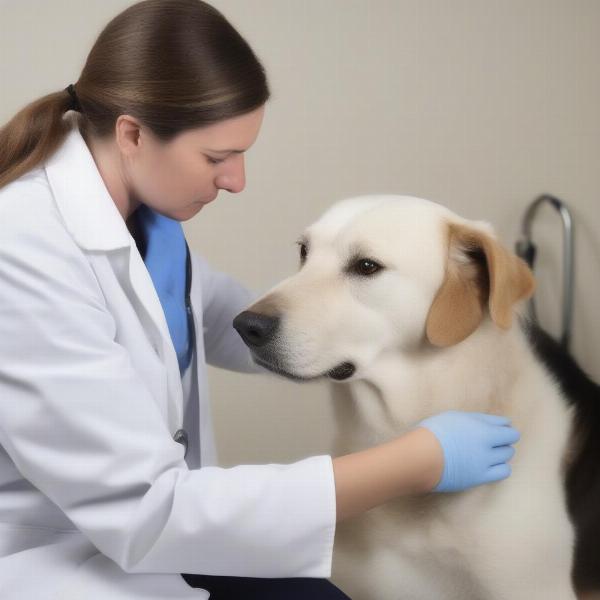Gastric carcinoma in dogs, also known as stomach cancer, is a serious and often devastating diagnosis. This comprehensive guide will explore the causes, symptoms, diagnosis, treatment options, and prognosis for canine gastric carcinoma, providing valuable information for concerned pet owners. Understanding this challenging disease can empower you to make informed decisions about your dog’s care and well-being.
Understanding Gastric Carcinoma in Dogs
Canine gastric carcinoma is a malignant tumor originating in the stomach lining. While relatively uncommon, it can affect dogs of any breed or age, though older dogs are generally more susceptible. The exact cause remains largely unknown, but factors like genetics, diet, and environmental influences may play a role.
Recognizing the Symptoms
Early detection of gastric carcinoma is crucial, but the symptoms can be vague and easily mistaken for other digestive issues. Some common signs include:
- Persistent vomiting
- Loss of appetite and subsequent weight loss
- Abdominal pain or discomfort
- Lethargy and weakness
- Black, tarry stools (melena) indicating gastrointestinal bleeding
Diagnosing Gastric Carcinoma
If you observe any of these symptoms, consult your veterinarian immediately. They will conduct a thorough physical exam and recommend diagnostic tests such as:
- Blood work to assess overall health and organ function
- Abdominal X-rays or ultrasound to visualize the stomach and surrounding organs
- Endoscopy to examine the stomach lining and collect tissue samples for biopsy
- Biopsy is the definitive method for diagnosing gastric carcinoma
Treatment Options for Canine Gastric Carcinoma
Treatment options for gastric carcinoma vary depending on the stage and extent of the tumor. They may include:
- Surgery to remove the tumor, if possible. This is often the most effective treatment for localized tumors.
- Chemotherapy to kill cancer cells and slow tumor growth.
- Radiation therapy to target and destroy cancerous tissues.
- Palliative care to manage symptoms and improve the dog’s quality of life when a cure isn’t possible.
 A veterinarian performing a physical examination on a dog suspected of having gastric carcinoma
A veterinarian performing a physical examination on a dog suspected of having gastric carcinoma
Prognosis and Long-Term Care
The prognosis for dogs with gastric carcinoma can vary greatly. Early diagnosis and aggressive treatment can improve the chances of survival, but the overall prognosis is often guarded. Factors affecting the outcome include tumor size, location, and whether it has spread to other organs. Your veterinarian will discuss the individual prognosis for your dog based on their specific situation. Supportive care at home is crucial, focusing on providing a comfortable environment, a nutritious diet, and managing any potential complications.
Conclusion
Gastric carcinoma is a challenging diagnosis for dog owners. While it’s a serious disease, understanding the symptoms, diagnostic process, and treatment options can empower you to provide the best possible care for your beloved companion. Early detection and prompt veterinary attention are crucial for improving the chances of a positive outcome. Remember to consult with your veterinarian for any concerns regarding your dog’s health.
FAQs
- What are the early signs of gastric carcinoma in dogs? Early signs can be subtle, including vomiting, loss of appetite, weight loss, and lethargy.
- How is gastric carcinoma diagnosed in dogs? Diagnosis involves blood tests, imaging (X-rays, ultrasound), endoscopy, and biopsy.
- Is gastric carcinoma curable in dogs? Cure is possible, particularly with early detection and surgical removal of localized tumors. However, the overall prognosis is often guarded.
- What are the treatment options for canine gastric carcinoma? Treatment options include surgery, chemotherapy, radiation therapy, and palliative care.
- What is the life expectancy for a dog with stomach cancer? Life expectancy varies significantly depending on the stage, tumor characteristics, and response to treatment.
- How can I make my dog comfortable during treatment for gastric carcinoma? Provide a comfortable environment, a palatable and nutritious diet, and manage any pain or discomfort as directed by your veterinarian.
- Are certain breeds of dogs more prone to gastric carcinoma? While any breed can be affected, older dogs are generally at higher risk.
Related Articles
cancer in dogs stomach
dog stomach cancer how long to live
About ILM Dog
ILM Dog (ilmdog.com) is your trusted global resource for expert canine care advice. We offer practical guidance on all aspects of dog ownership, from breed selection and puppy care to senior dog health and specialized topics like canine gastric carcinoma. Our team of experienced writers and dog enthusiasts are dedicated to providing accurate and up-to-date information to help you navigate the joys and challenges of dog ownership. For expert advice on dog health, nutrition, training, or product recommendations, contact us at [email protected] or call +44 20-3965-8624.